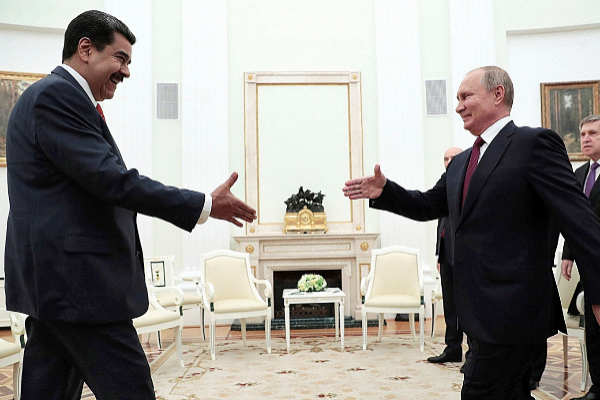- Crisis "Maduro's parliamentary coup" to snatch the Assembly from the opposition
- National Assembly: Juan Guaidó swears as interim president of Venezuela after entering Parliament
- Juan Guaidó.Ratified at the headquarters of 'El Nacional': "It's time to raise your voice, we need to take the rest"
The US special envoy for Venezuela, Elliott Abrams, admitted Monday that "we underestimate the support of Cuba and Russia to the regime" of Nicolás Maduro. It has been, Abrams said, the capital error in the US strategy towards Caracas, because, without the support of both countries, Venezuela could easily be on the road to a democratic transition. Moscow and Havana "are the two most important pillars of support for the regime and, without them, [Maduro] would not be in power," Abrams concluded, in statements to the Bloomberg news agency.
Today, according to Trump's special envoy for that country, Russian companies handle around 70% of Venezuelan oil. Among the operations that the companies of that country carry out is the transfer of cargoes of crude oil between ships, which allows Venezuela to partially avoid US sanctions. In addition, Russian state oil giant Rosneft "is at the center of Venezuela's oil economy, " Abrams explained in a later meeting with the media.
In addition, the United States Government considers that for about a year there have been approximately 2,500 Cuban intelligence and security agents in Venezuela, apart from the technicians, doctors and teachers that the regime of Miguel Díaz-Canel and Raúl Castro keep in That country. Besides, Russia has, according to Abrams, 150 troops in Venezuela. The White House envoy did not go into details regarding the possible presence of Moscow military contractors in the country.
Abrams' statements show that, without the support of Moscow and Havana, Maduro's regime would not last a quarter of an hour. The US special envoy for Venezuela encrypted popular support for the current Venezuelan government "about 10%, occasionally 12%" of the population. In his opinion, the Venezuelan regime is doomed to disappear, although it is impossible to know when that will happen. As Abrams said, "Last July I think Felipe González said that we already know what will happen, we will see the fall of the regime and the redemocratization of Venezuela. Nobody knows the day."
The American diplomat, who is a 'neoconservative', that is, an interventionist, maintains an excellent personal relationship with González since the 1980s, when the Spanish president definitively integrated Spain into NATO and proposed to the US to host several dictators Latin Americans in exchange for leaving power.
The point is that in the realm of concrete realities, Abrams announced nothing. He explained that the United States will maintain its support for the president in charge Juan Guaidó, who has the support of approximately one third of the countries in the world, and the National Assembly, which is not controlled by Chavism, and did not rule out new sanctions against the Maduro regime. But apart from that there is nothing new.
Washington continues to insist that it does not rule out the military option, but that seems more than remote. In fact, the Donald Trump Government continues to prefer a negotiated exit with a sector of Chavismo that does not agree with the hard line imposed by Maduro, the Russians and the Cubans. Abrams made it very clear by stating that "Chavismo is a movement and it is not Nicolás Maduro, and I think there are many Venezuelans who would say 'I am Chavista' who reject what happened yesterday." The democratic future that Washington wants for Venezuela thus includes "any democratic citizen of the left, of the right, of the center, of Popular Will, of First Justice, of a democratic Chavez party."
According to the criteria of The Trust Project
Know more- Venezuela
- Russia
- U.S
- Nicolás Maduro
- Cuba
- Donald Trump
- Venezuela Elections
- America
Venezuela Chavismo withdraws immunity to four opposition deputies and accuses them of treason
Venezuela Juan Guaidó swears as interim president of Venezuela after entering Parliament
OAS Policy, the new ideological battle of America

